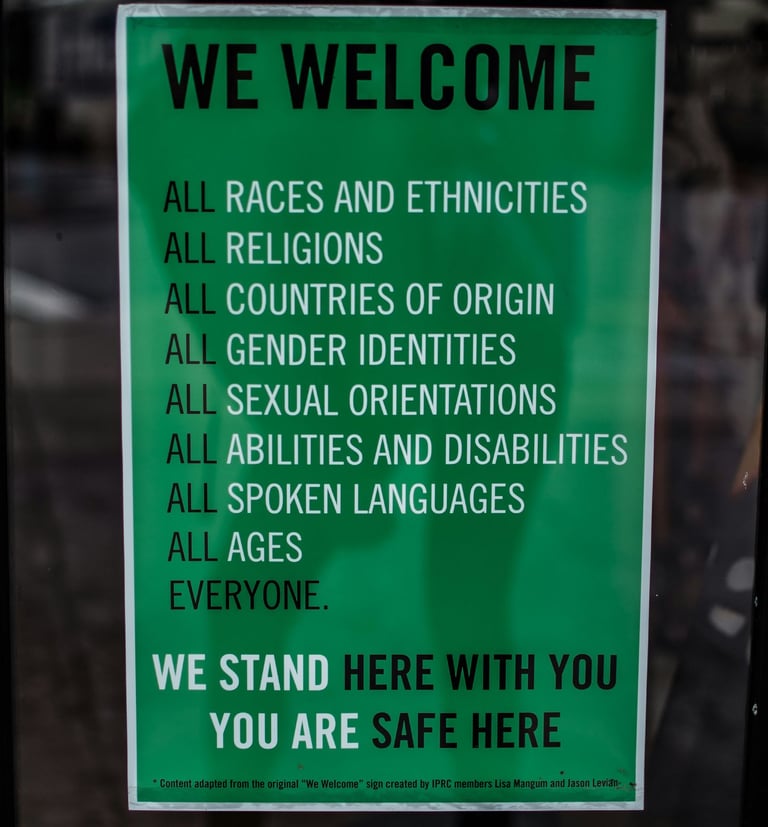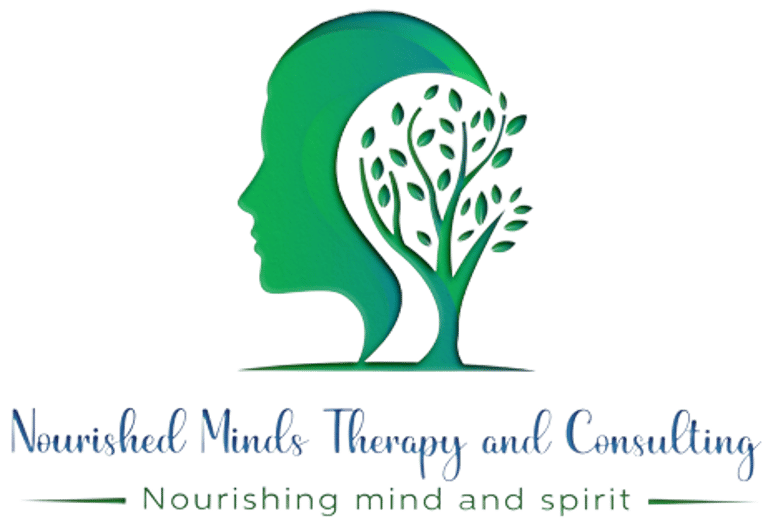

When seeking therapy, I believe that it is a MUST to find a practitioner who understands and validates the full scope of your identity. For people of color, queer individuals, immigrants, women, those living in larger bodies, and those with other intersecting marginalized identities, affirming and culturally competent therapy can genuinely mean the difference between getting help or getting harmed. A truly affirming therapist will recognize the profound impact of dynamics such as systemic oppression, ableism, generational trauma, and institutionalized discrimination, and will tailor treatment to meet those specific needs.
Understanding and addressing these complexities requires more than a surface-level understanding of diversity or buzz phrases such as, "You are safe here," or "Multiculturally Competent." A therapist should bring an intersectional perspective, recognizing how different aspects of a client’s identity—such as race, gender identity, sexual orientation, and body size—intersect and create unique challenges. In this kind of affirming therapy, the focus is on empowering clients to navigate personal, political, cultural, and societal struggles while cultivating a deep sense of self-worth and agency. In this post, I am sharing tenants I personally strive to uphold and that I highly recommend you as a client look for in a therapist if any of these themes resonate with you. This list is far from exhaustive, but is a good starting point if you are looking for truly whole-person support.
What to Look for in Culturally Competent Therapy
Therapists who are culturally competent and affirming will start by making an effort to understand your unique cultural, social, and historical context. This involves not only recognizing visible aspects of identity like race or sexual orientation, but also understanding how these intersect with experiences of discrimination, such as racism, homophobia, transphobia, and sizeism. A skilled therapist will create a space where all parts of your identity feel seen and respected, free from judgment or assumptions.
A culturally competent therapist will:
Understand Intersectionality: This means recognizing that people do not experience oppression in a vacuum. For example, a Black transgender woman may face compounded forms of discrimination from both racism and transphobia. An affirming therapist acknowledges these overlapping identities and how they contribute to mental health challenges.
Incorporate Cultural Context into Treatment: Rather than applying a generic treatment model, a culturally competent therapist integrates cultural understanding into their approach. For example, they will consider how cultural norms around gender, body image, or family structure influence mental health, and will adapt treatment plans accordingly.
Use Trauma-Informed Care: For many individuals from marginalized backgrounds, experiences of trauma are often shaped by systemic oppression. A trauma-informed therapist will understand that trauma is not just an individual experience but can be collective, passed down through generations, and rooted in experiences of historical or ongoing oppression. They will create a safe environment for exploring how these broader systems of oppression have impacted your mental health.
Adapting Therapeutic Approaches for Diverse Backgrounds
Many evidenced based therapeutic models can be beneficial to clients from an intersectional lens. Approaches I use here at Nourished Minds Therapy (such as Eye Movement Desensitization and Reprocessing (EMDR), Internal Family Systems (IFS), Acceptance and Commitment Therapy (ACT), and Dialectical Behavior Therapy (DBT)) can be highly effective when adapted to respond to diverse cultural backgrounds and intersectional identities. This is especially true given that many of the most widely used therapeutic approaches (including those I've listed here) have taken some of their most fundamental concepts from various indigenous and multicultural healing practices of previous generations. Here are examples of how each approach can be adjusted to ensure that therapy is both affirming and culturally responsive:
EMDR (Eye Movement Desensitization and Reprocessing)
EMDR is often used to treat trauma by helping individuals process distressing memories in a way that leads to healing. However, for people from marginalized communities, trauma is frequently compounded by experiences of systemic oppression, racism, homophobia, and other forms of discrimination. In culturally competent therapy, EMDR is adapted to acknowledge not only personal trauma but also the collective and generational trauma that marginalized individuals carry.
For example, when working with BIPOC clients, a therapist might help reprocess memories related to racial violence or microaggressions. When treating LGBTQ+ clients, the focus might be on processing experiences of family rejection or societal discrimination. By recognizing that trauma can stem from both personal experiences and oppressive systems, EMDR becomes a powerful tool for healing trauma rooted in discrimination and marginalization.
IFS (Internal Family Systems)
Internal Family Systems (IFS) is a therapeutic model that helps individuals explore and heal the different "parts" of themselves. This can be especially effective for clients from marginalized communities who have internalized harmful societal messages. Many people from marginalized backgrounds develop internal conflicts due to navigating multiple identities within oppressive systems, such as a queer person of color who experiences internalized homophobia and racism simultaneously.
In affirming therapy, IFS is used to explore these internal conflicts with compassion, helping individuals connect with different parts of themselves in a way that fosters self-acceptance. A culturally competent therapist will work with clients to understand how external societal pressures and discrimination may have contributed to the development of these internal parts. For example, a person may have developed a protective part that suppresses their identity to stay safe in environments that are not accepting. IFS allows for a deep, healing exploration of these parts while affirming the client’s full identity.
ACT (Acceptance and Commitment Therapy)
ACT focuses on helping clients accept their thoughts and feelings while committing to actions that align with their values. For individuals from marginalized groups, this can be incredibly empowering, especially when therapy is adapted to address the unique pressures and challenges of systemic discrimination.
In an affirming and culturally competent ACT framework, the therapist works with clients to navigate societal pressures while staying true to their values. For instance, a person of color facing systemic racism in the workplace might struggle with feelings of anger or frustration, compounded by messages that these emotions are "unacceptable" or "unprofessional." In this context, ACT helps the client accept their emotional responses as valid, while supporting them in choosing actions that align with their personal and cultural values—whether that’s advocating for themselves, setting boundaries, or engaging in activism.
ACT’s focus on mindfulness and acceptance can also be tailored to include culturally relevant practices, such as integrating spirituality, meditation, or other culturally significant forms of healing. This allows clients to feel connected to their heritage while managing mental health challenges.
DBT (Dialectical Behavior Therapy)
Dialectical Behavior Therapy (DBT) is particularly useful for individuals who struggle with intense emotions and have difficulty regulating their responses to stress. For clients from marginalized backgrounds, stress often stems from navigating oppressive systems, whether it’s discrimination in the workplace, societal expectations around body image, or living in a world that does not affirm their gender or sexual orientation.
A culturally competent therapist will adapt DBT techniques to help clients manage the emotional toll of systemic oppression. This might involve using distress tolerance skills to navigate situations where clients feel unsafe or invalidated, or practicing interpersonal effectiveness to assert their needs in environments that are not supportive of their identity.
Additionally, DBT’s focus on mindfulness can be tailored to include culturally relevant practices. For some clients, this might involve incorporating traditional or spiritual forms of mindfulness from their cultural background, allowing for greater connection to their identity while managing stress.
Healing from Systemic Oppression and Trauma
One of the key aspects of affirming, culturally competent therapy is recognizing that many mental health issues experienced by marginalized individuals—such as anxiety, depression, and low self-esteem—are not just personal struggles, but are deeply connected to systemic oppression. Whether it's generational trauma passed down through a family affected by colonization, or the daily microaggressions faced by a person navigating predominantly white spaces, these experiences take a toll on mental health.
An affirming therapist will validate the realness of this trauma and work with clients to explore how societal messages about their worth have impacted their mental health. This might involve challenging internalized racism, sexism, or homophobia, and creating a space where clients can reconnect with a sense of pride in their identity.
Additionally, affirming therapy should provide tools to navigate the external world. For example, clients might learn strategies for dealing with discrimination or microaggressions, or for finding community and support in spaces that affirm their identity. Building a sense of community is especially important, as marginalized individuals often face isolation and lack of support in mainstream society.
Recognizing Therapy as Political and Advocating for Systemic Change
An essential aspect of affirming, culturally competent therapy is recognizing that therapy itself is inherently political. For individuals from marginalized communities, mental health struggles often stem from systemic issues like racism, sexism, homophobia, transphobia, and other forms of oppression. A therapist who is truly affirming understands that addressing these personal challenges requires an acknowledgment of the larger societal structures that contribute to them. More than just focusing on individual healing, an affirming therapist also sees themselves as an advocate for systemic change. This means not only working with clients to manage the effects of oppression but also actively supporting broader efforts for social justice and equity. By advocating for changes in policy, raising awareness about systemic issues, and working toward dismantling oppressive systems, therapists play a crucial role in fostering environments that allow their clients—and marginalized communities as a whole—to thrive.
Empowerment Through Self-Advocacy
Another critical component of affirming, culturally competent therapy is empowerment. For many people from marginalized communities, therapy is not just about healing but also about reclaiming their power and voice in a world that has often silenced them. This might involve helping clients build self-advocacy skills, so they feel more confident in asserting their needs in personal, professional, and societal spaces.
In an affirming therapeutic space, clients can practice setting boundaries, expressing their needs, and navigating difficult conversations around their identity. Therapy can also serve as a space to process feelings of anger, frustration, or sadness that arise from living in a world that doesn’t always affirm one’s identity, helping clients transform these feelings into action that aligns with their values.
The Importance of Cultural Humility in Therapy
Lastly, affirming, culturally competent therapy is a continuous process. A therapist who is truly culturally competent will practice cultural humility, which means continually learning about different cultures, histories, and experiences and being open to feedback from clients about their specific needs. In the grand scheme of unlearning so many harmful messages from oppressive systems, I realize that in many ways I am in the early stages, but emboldened to continue the learning/unlearning journey both for personal healing and societal healing. Simply put, inasmuch as our intersecting identities may tell a story, no one is the expert on you but you, and your therapist needs to be open to the narrative of your unique story.
Therapists who work with marginalized clients should understand that cultural competence is not about mastering knowledge of every identity, but about being open, flexible, and responsive to the client's unique lived experience. It’s about creating a collaborative therapeutic relationship where the client feels empowered to share their story and shape their healing process.
When seeking therapy as a person of color, a person living with a disability, a queer individual, or someone with any number of intersecting marginalized identities, it’s crucial to find a therapist who provides culturally competent, affirming care. This means looking for a practitioner who integrates intersectionality, trauma-informed care, and adaptable therapeutic approaches into their practice, and who fosters a space of empowerment, healing, and self-advocacy.






